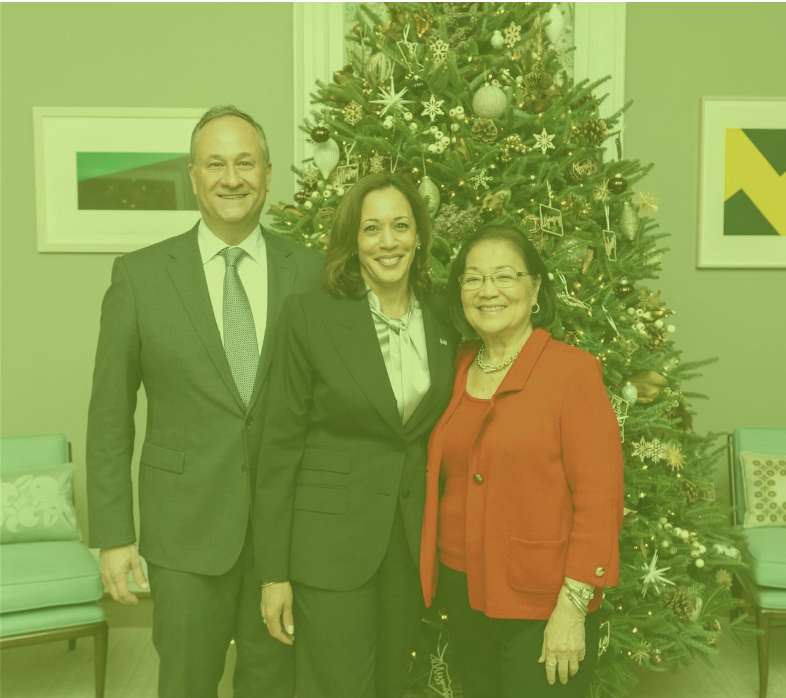When Biden dropped out of the presidential race on July 21st, many assumed Kamala Harris would take his seat as the Democratic nominee. Although she got the delegate votes to secure her seat in the presidential election, she–and her marketing team–have not stopped utilizing Gen Z’s trends and favorite idols to garner more attention toward her campaign. Numerous TikTok and Instagram accounts under Harris’ name posted many clips with viral audio in the background. Biden followed a similar strategy during the 2020 election, but to many, Harris’ social media presence is unparalleled. Depending on which social media echo chamber your algorithm feeds into, you might see pages highlighting Harris hyping the audience at one of her rallies, hugging kids, insulting Trump, or even talking about coconut trees.
Musicians and Politics
If you have TikTok or Instagram Reels, I’m sure your feed has been taken over with lime green backgrounds, filters, and objects with “brat” branded on top. The electropop album “brat” by Charli XCX became this summer’s top trend; many have labeled the summer of 2024 as a “brat summer.” According to CNBC, “brat” appealed to many teens who wanted to embrace the “cool-girl aesthetic” that promoted a rebellious spirit. Eventually, its distinct album cover and bold electronic sound became recognizable across all platforms as a meme.
At first, this trend was not associated with any political figure, but on July 22nd, that all changed. Singer Charli XCX’s tweet: “kamala IS brat,” gained 300,000+ likes and over 50 million views. Charli XCX explained that “brat” is not just a term, but a “lifestyle.” Consequently, Kamala’s official campaign account adopted a bright brat-green profile picture. Even local Senator Mazie Hirono announced her support for Harris with a lime-green tinted Instagram post, captioned with: “Kamala IS a fierce, committed, and effective champion for the American people. ” It is also not a coincidence the captions in Charli and Senator Hirono’s posts match. Musicians and celebrities have shown their support to political candidates during pretty much every election, and their social media presence tremendously impacts their supporters and other youth.
In addition to Charli XCX, Harris has gathered support from many other famous and popular music artists. Indie folk band Bon Iver and rapper Megan Thee Stallion performed at Harris and Walz’s rallies in August. Meanwhile, the Trump and Vance rallies invited musician Kid Rock and country artist Chris Janson to perform. The recent presidential election in 2016 also had popular artists perform, though; many audience members seemed to enjoy it. However, this begs the question: will an increasing amount of political associations between celebrities and politicians lead to an even more polarized cultural divide in the United States? As social media users get sucked into different echo chambers in apps such as TikTok, political opinions become more extreme and split.
Social Media
However, it’s not just Harris who relies on youth marketing. Whether you notice it or not, Donald Trump utilizes social media too–just in different ways. In 2018, hip-hop musician Kanye West heavily endorsed Trump’s presidency and even met with him at the White House. To this day, Kanye appears at Trump rallies and wears the infamous red “Make America Great Again” cap. Moreover, Donald Trump’s personal social media accounts are quite unique. His quotes, pictures, and tweets frequently end up on the trending topics pages on Facebook and Twitter, according to Inc. Youth who don’t spend a lot of time reading the news might turn to social media, and Trump’s strategy increases name recognition among these audiences.
For Gen Z, Gen Alpha, and many Millenials, Facebook is no longer the viral platform it used to be. Now, TikTok has captured our attention, and these candidates seem to tend to Gen Z’s infatuation. @kamalaharris has 4.5 million followers, and @realdonaldtrump has 10.4 million. Kamala Harris’ campaign account, @kamalahq, posted many popular TikToks with millions of likes. These TikToks utilized mainstream audios and formats that aligned with many Gen Z trends circulating on the platform. She even has a trending audio, famously referred to as her “coconut tree remark.” The quote originates from last year, during a White House event when Kamala Harris reflected on her childhood and delved into a story about her mother. According to Harris, her mother once asked her, “You think you just fell out of a coconut tree?” Then, Harris continues, “You exist in the context of all in which you live and what came before you.” For those not addicted to social media, this might be your first encounter with this popular quote. Upon hearing this for the first time, I thought the contents of this quote lacked context and seemed unrelated to Harris’ campaign. Yet, this quote somehow caught the attention of many teenagers; TikTok videos with the coconut tree audio have thousands, if not millions, of likes. In fact, for the average teenager, it might be easier to quote the coconut tree line than to reference any of Harris’ policies or political ideals.
Truthfully, as students and social media-addicted teens, it is difficult to ignore these targeted political marketing techniques. Among students I’ve talked to, candidates’ social media accounts have become a focal point of conversation instead of the ideals they advocate for. Even though many of us are not of legal voting age, we must make judgment calls on a candidate based on their political views and not their social media pages. Marketing politics toward younger audiences is nothing new, and it will unlikely stop after this election cycle.

